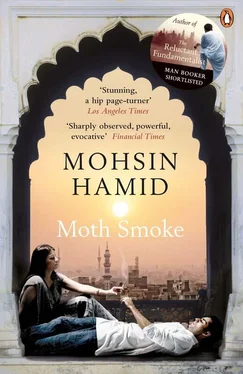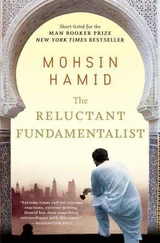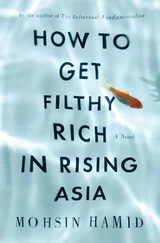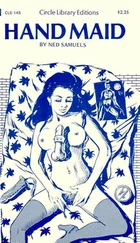Luckily for the downtrodden, in the midst of all this money laundering, of transforming ill-gotten gain into prestigious titles and luxurious mansions, we have a Champion of the Good. Tan-ta-ta-ran! It’s Darashikoh Shezad. But wait a minute. What does he do? He’s a banker. An account manager, as a matter of fact. And whose accounts does he manage, what clients does he please, whose asses, if you’ll pardon the expression, does he kiss? Men like my father’s. So enough of this nonsense about me being the big bad money launderer and Daru being hung out in the wash. We’re all in this together.
And let me tell you something else about Daru. Just before she left me, Mumtaz hired a houseboy. A very hard-working kid. Good-natured. Sweet. Cooks. Cleans. And I was glad to have him, because, jokes aside, it’s difficult finding good servants these days. Anyway, the boy’s name was Manucci, and it turned out he used to work, if you can call slave labor work, for Daru. For the man of the people himself. Why did he run away? Because Daru beat him, humiliated him, and didn’t pay him, sometimes for months. That’s right: self-righteous Daru is a hypocrite and a menace. Ask Manucci. As soon as his knees stop knocking together, he’ll tell you.
So take another look at us, Daru and me. I may clean dirty cash, but I don’t beat defenseless children and I don’t screw my friends’ wives and I stand by my father when push comes to shove.
Not convinced? Still think I’m the bad guy? Then do me a favor and try to put yourself in my shoes. Just for a moment. Don’t think you can? Well, let me tell you a story.
Once upon a time there were two boys. Let’s call them Hero and Villain, or Ro and Lain for short. Ro’s a pudgy little kid, quiet, studious, with a runny nose. He has no real friends. You know, one of those social misfits you had in your junior school class who hung out together because they were ostracized by everyone else.
Anyway, this kid, Ro, drives to school every morning with another kid, Lain. They’re driven by Lain’s dad’s driver in Lain’s dad’s car. Lain sits in the front and Ro sits in the back, and they hardly exchange a word, because Lain’s ashamed of Ro. Lain, you see, is a stud, even at age five. He’s not the fastest sprinter in the class, the best batsman, the most brilliant student, the scrappiest fighter, or the cheekiest prankster. But he can run fast, he is good with a bat, he does get solid marks, he will stand up to bullies, and he isn’t scared of getting caned if a joke is funny enough. And most important of all, people like him. He can make friends with a grin, and he knows it.
Yes, I won’t deny it, Lain’s a little asshole.
Lain isn’t mean to Ro. Not exactly. He just ignores him. But the more he does, the more Ro looks up to him with puppy-dog affection, ready and eager to do Lain’s homework whenever Lain will let him.
Anyway, this pathetic state of affairs lasts until the end of junior school. Until the arrival of Ataris in Lahore, to be precise. Lain is the first kid in the class to get one, and his father forces him to invite Ro over to use it, which Lain does rather ungraciously.
The funny thing is, fat little Ro is actually good at it. Combat, Adventure, Space Invaders: by the end of a day he’s teaching Lain new tricks. And a friendship begins to form between the two, not much of a friendship, it’s true, but something. They start playing every weekend. Ro spends a night once. Twice. Then sleepovers become more regular. And because Lain’s parents force them to go to bed when they’re still wide awake, the two boys find themselves chatting until they fall asleep. Neither has a brother, so each is getting to know another boy really well for the first time in his life.
Lain has a wild imagination. He’s always liked to pretend that he’s stranded on a desert island, or fighting in a war, or whatever. And the boys are now getting to an age where make-believe is uncool. But to Ro, everything Lain does is cool, so Lain feels comfortable playing games with Ro he wouldn’t play with his other friends, and telling him things he’d never tell anyone else. And Ro, for his part, turns out to be the most loyal friend imaginable.
Well, things might have stayed like that, Ro remaining Lain’s loving pet forever, but Defender came to town. By now, many boys in school have Ataris, and they decide to have a competition at somebody’s house, a video-game battle to find out who really is the best of the best and who’s just talk. And naturally, the game for the competition is Defender.
The week before, Lain practices every day. And by the time the weekend rolls around, he’s ready. When the dust has settled and all twenty-eight boys have taken their turn, it’s official: the highest score goes to Lain. He’s the champ. And Ro, the video-game wunderkind, is number two.
Ro has probably never been second at anything in his life. All the boys are impressed that he’s done so well. But I guess he wanted more. He wanted to win, to be the best, just this once. So when Lain goes up to his friend to congratulate him, Ro says, ‘If I had an Atari at my house, I could have scored double what you did.’
Lain, shocked at this display of bad sportsmanship, says without thinking, ‘You might as well take mine, then. You’ll never have one unless my family gives it to you.’
And right there, as twenty-six of their classmates look on, oohing and aahing, Ro turns red as a tomato and starts to cry.
The other boys laugh at him.
And Lain, for probably the first time in his young life, realizes what an asshole he is.
Ro won’t talk to Lain for a long time after that. They still drive to and from school together every day, but Ro won’t say a word. Lain, surprisingly enough, is miserable. So one day he goes to Ro’s house and breaks down in front of Ro’s mother and starts sobbing and tells her how sorry he is. She calls Ro into the room and Ro forgives Lain. And after that the two become best friends.
Ro still looks up to Lain because he’s cool and popular. Lain gives Ro his first cigarette, his first blue video, his first joint. He sets Ro up on his first date. Helps him pick out his first leather jacket. Teaches him how to use gel and pull a one-eighty.
And Lain, for his part, respects Ro for his honesty and decency.
Meanwhile, both boys are going through some changes. In particular, fat little Ro isn’t quite so fat or little anymore. His uncle is teaching him how to box, he’s exercising like a maniac, and he’s becoming stronger by the day. He isn’t a pretty boy by any stretch of the imagination, but girls are beginning to notice him. Together, Lain and Ro share the adventures that are the plus side of developing a bad reputation.
By the time they enter senior school, they’re in love. No, no, nothing like that. Do I really have to spell it out for you? Many boys, probably most boys, have a first love before they fall in love with a woman. It begins the moment two boys realize they’d die for one another, that each cares more for the other than he does for himself, and it lasts usually until a second love comes on the scene, because most hearts aren’t big enough to love more than one person like that.
Ro and Lain realize they’re in love one evening on Ro’s roof, as they lie on their backs sharing a joint and holding the string of a battered patang, undefeated after five kite fights. ‘I love you,’ Lain says suddenly. And Ro, who’s probably surprised, even more so when he realizes that he’s been longing to hear those words for some time, says, ‘I love you, too.’ And they don’t look at each other, they’re too embarrassed, but all in all, they feel pretty good.
Then SAT season arrives and Lain does well and Ro does better. They apply to the same eight colleges. Lain gets into three and Ro doesn’t get into any, because he’s asking for financial aid and it’s hard to get when you’re a foreign student. So Lain jets off to the States and Ro enrolls in GC. After that, they see each other only during vacations, but their lives are following different paths. Lain loves college abroad. Ro hates GC. And even though he makes the boxing team year after year, he’s never good enough to win a title for himself.
Читать дальше












